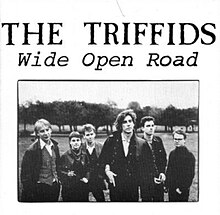
Eskimo Joe are an Australian alternative rock band that was formed in 1997 by Stuart MacLeod, on lead guitar, Joel Quartermain, on drums and guitar, and Kavyen Temperley, on bass guitar and vocals, in East Fremantle, Western Australia, Australia.
The Triffids were an Australian alternative rock and pop band, formed in Perth in Western Australia in May 1978 with David McComb as singer-songwriter, guitarist, bass guitarist and keyboardist. They achieved some success in Australia, but greater success in the UK and Scandinavia in the 1980s before disbanding in 1989. Their best-known songs include "Wide Open Road" and "Bury Me Deep in Love". SBS television featured their 1986 album, Born Sandy Devotional, on the Great Australian Albums series in 2007, and in 2010 it ranked 5th in the book The 100 Best Australian Albums by Toby Creswell, Craig Mathieson and John O'Donnell.

The Beautiful Girls are an Australian roots music group founded in Sydney in 2001 by Mat McHugh, Clay MacDonald, and Mitchell Connelly. They have released three extended plays, Morning Sun (2002), Goodtimes (2002), and The Weight of the World (2004), plus five studio albums, Learn Yourself (2003), We're Already Gone (2005), Ziggurats (2007), Spooks (2010), and Dancehall Days (2014). The last four albums have all peaked into the top 20 on the ARIA Albums Chart. Spooks and Dancehall Days also debuted at No. 1 on the Australian Independent Chart and No. 7&5 on the American Billboard Reggae Albums Chart, respectively. Their single "I Thought About You" reached No. 60 on the ARIA Singles Chart.

David Richard McComb was an Australian musician. He was the singer-songwriter and guitarist of the Australian bands, The Triffids (1976–89) and The Blackeyed Susans (1989–93). He also had a solo career including leading David McComb and The Red Ponies. Over his career McComb had bouts of alcoholism, and amphetamine and heroin abuse. He developed cardiomyopathy and in 1996 underwent a heart transplant. David McComb died on 2 February 1999 "due to heroin toxicity and mild acute rejection of his 1996 heart transplant", according to the coroner. In May 2001, the Australasian Performing Right Association (APRA), as part of its 75th Anniversary celebrations, named "Wide Open Road" by The Triffids – written by McComb – as one of the Top 30 Australian songs of all time. On 1 July 2008 The Triffids were inducted into the ARIA Hall of Fame with McComb's contribution acknowledged by a tribute performance.

Martyn Paul Casey is an English-born Australian rock bass guitarist. He has been a member of the Triffids, Nick Cave and the Bad Seeds and Grinderman. Casey plays either his Fender Precision Bass or Fender Jazz Bass.
For the American band with a similar name, see Blackeyed Susan.
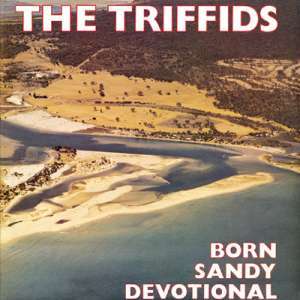
Born Sandy Devotional is an album by The Triffids, released in March 1986. The songs were written by David McComb.
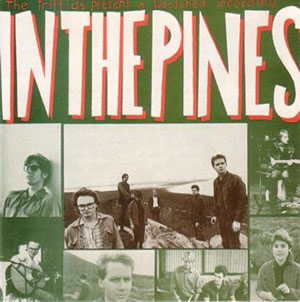
In The Pines is an album by The Triffids, released in August 1986, which reached No. 69 on the Australian Album Charts.

Calenture is the fourth studio album by Australian rock group The Triffids, it was released in November 1987 and saw them explore themes of insanity, deception and rootlessness—the title refers to a fever suffered by sailors during long hot voyages. It reached No. 32 on the Australian Kent Music Report Albums Chart. In November 1987, it reached No. 24 on the Swedish Albums Chart, in May 1988 it peaked at No. 25 on the New Zealand Albums Chart. The album spawned three singles, "Bury Me Deep in Love" (1987), "Trick of the Light" and "Holy Water". The latter track was recorded with American producer Craig Leon.

Love In Bright Landscapes is an anthology by Australian folk rock group, The Triffids, which was released in 1986. The original LP had ten tracks compiled from their album, EP and single releases in the period from 1983 to 1985, during which time the group were resident in Perth, Sydney and London. Three additional tracks from the same sources were included on the later CD version of the album.

Treeless Plain is the debut album by The Triffids, released in November, 1983. The album was recorded at Emerald City Studios, Sydney, Australia in twelve midnight to dawn sessions, during August through to September 1983. It was the band's first release after signing with Hot Records.
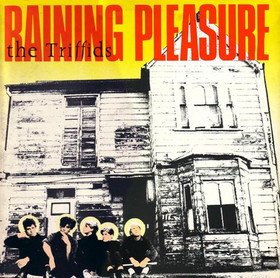
Raining Pleasure is a record released in 1984 by the Australian folk rock group The Triffids as a 12" vinyl EP. It reached No. 95 on the Australian Charts. Its seven tracks were co-produced by the group with Nick Mainsbridge who also supplied trumpet.
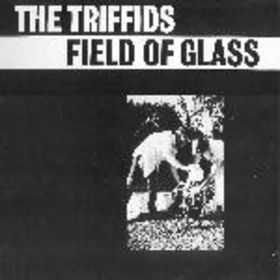
Field Of Glass by The Triffids was released as a 12" extended play in 1985. All three tracks were generally recorded live at BBC Studio 5, Maida Vale, London. The EP was produced by Mark Radcliffe, engineered by Mike Robinson, engineered by Owen Davies and remixed by Nick Cook at Townhouse 3.
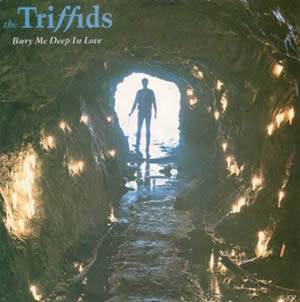
Bury Me Deep in Love is a single released by Australian rock group The Triffids from their album Calenture. It appeared in October 1987 and reached No. 48 on the Australian Kent Music Report Singles Chart. It was produced by Gil Norton and written by David McComb, the group's lead singer and guitarist. The B-sides "Baby Can I Walk You Home" and "Region Unknown" were produced by Victor Van Vugt and The Triffids. The single was released as 7", 12" & CD single versions.
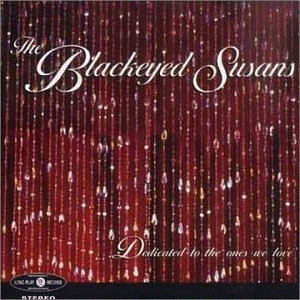
Dedicated to the Ones We Love is the fifth studio album by the Australian folk rock group The Blackeyed Susans and was released on 23 April 2001. It is the first issued on their own label, Teardrop, and was distributed through Shock Records. As the name suggests, it is a collection of cover versions, focusing on songs that have influenced and inspired the band. It includes songs made popular by Frank Sinatra, Elvis Presley, The Crystals, Bob Dylan, The Velvet Underground, and, most poignantly, The Triffids. The Triffids were the previous band of David McComb, who had died in 1999 and was a founding member of The Blackeyed Susans. The album was well received by the public and lauded by the critics, a national tour followed keeping the band busy until the end of the year.

"Holy Water" was the third single taken from Australian rock group The Triffids' Calenture album, and was released in August 1988. It was produced by Craig Leon and was written by lead guitarist and lead singer David McComb. This was one of only two tracks that resulted from Leon's production of the band's fourth album. The production costs of Leon's efforts were more than the total costs of the band's break-through album, Born Sandy Devotional. The record sleeve however credits the production to Gil Norton who produced the remainder of the album with the band. The single was released as 7", 12" and CD single versions by Island Records but failed to chart in either Australia or the United Kingdom.
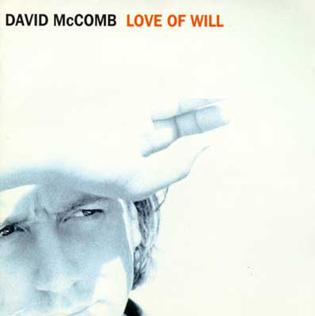
Love of Will is the only studio album by David McComb, released in March 1994. The album was recorded and mixed between June and August 1993, at Platinum Studios with additional mixing at Metropolis and Sing Sing Studios. McComb selected 13 songs out of a pile of 35 and recorded them at Platinum Studios, Melbourne with producer Nick Mainsbridge, together with freelance musical directors Graham Lee and David McComb, and assistant engineers Kalju Tonuma and Phil Jones.

"Beautiful Waste" is a single released by Australian rock group, The Triffids in February 1984. It was not included on any of the band's studio albums nor extended plays, it was first compiled on Australian Melodrama (1994). The B-side, "Property Is Condemned", was included on the 1984 EP Raining Pleasure. A film clip was made for "Beautiful Waste". Its name was adapted for a 2008 posthumous compilation of mid-1980s non-album tracks, Beautiful Waste and Other Songs.
Jillian Margaret Birt is an Australian rock musician and architect. Birt was the keyboardist and vocalist of the alternative rock and pop band, The Triffids from 1983 to 1989. In 2008, The Triffids were inducted into the Australian Recording Industry Association Hall of Fame.
Martha's Vineyard were an Independent music, Alternative rock, Australian rock band, formed in Perth in May 1986 by lead singer, Peggy Van Zalm. In June 1989 the group issued their debut self-titled album on rooArt, which was produced by Nick Mainsbridge. It peaked in the top 100 on the Kent Music Report Albums Chart. Australian musicologist, Ian McFarlane, described their sound as "reflective folk rock [which] mixed melancholy vocals, acoustic and electric guitars, gentle percussion and spacious arrangements to arrive at a harmonious and intriguing whole". They shared a similar sound and outlook to that of fellow Perth bands like The Triffids, The Honeys and Chad's Tree. Van Zalm's vocals drew positive comparisons with Patti Smith, Chrissie Hynde and Joni Mitchell. The group had toured nationally supporting Simply Red, INXS, Eurythmics, The Go-Betweens, Paul Kelly, The Triffids, Mental as Anything, proto-punk garage band The Saints and Weddings, Parties, Anything, before disbanding in 1990. By 1994 Van Zalm had launched her solo career.
